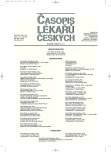Antidiabetics therapy and cardiovascular risk: 2010
Authors:
Jiří Charvát; Milan Kvapil
Authors‘ workplace:
Univerzita Karlova v Praze, 2. lékařská fakulta, Interní klinika FN Motol
Published in:
Čas. Lék. čes. 2010; 149: 235-241
Category:
Special Articles
Overview
Prevalence of coronary artery diseases in diabetic patiens is high. The risk of the cardiovascular complications increases in concordance with higher glycosylated hemoglobin. Treatment of the hyperglycemia, dyslipidemia and hypertension is preventive of the cardiovascular complications.
Key words:
diabetes mellitus, coronary artery diseases, oral antidiabetics, insulin.
Sources
1. Haffner SM, Lehto S, Rönnemaa T, Pyorälä K, Laakso M. Mortality from coronary heart disease in subjects with type 2 diabetes and in nondiabetic subjects with and without previous myocardial infarction implications treatment of hyperlipidemia in diabetic subjects without prior myocardial infarction. N Engl J Med 1998; 339 : 229–234.
2. UK Prospective Diabetes Study (UKPDS) Group. Intensive blood-glucose control with sulphonylureas or inzulín compared with conventional treatment and risk of complications in patients with type 2 diabetes (UKPDS 33). Lancet 1998; 352 : 837–853.
3. UK Prospective Diabetes Study (UKPDS) Group. Efficiacy of atenolol and captopril in reducing risk of macrovascular complications in type 2 diabetes: UKPDS 39. BMJ 1998; 317 : 713–720.
4. Holman RR, et al. 10-year folow up of intensive glucose control in Type 2 diabetes. N Engl J Med 2008; 359 : 1577–1589.
5. Ray KK, et al. Effect of intensive control of glucose on cardiovascular outcom and death in patiens with diabetes mellitus: a meta-analysis of randomised controlled trials. Lancet 2009; 373 : 1765–1772.
6. Settler CH, et al. Glycemic kontrol and macrovacular dinase in types 1and 2 diabetes mellitus: Meta-analysis of randomised trials. Am Heart J 2006; 152 : 27–38.
7. Turnbull F, Abraira C Anderson R Byington R Chalmers J, et al. Intensive glucose control, and macrovascular outcomes in type 2 diabetes. Diabetologia 2009; ePub ahead of print.
8. Abraira C, et al. Glycaemic separation and risk factor control in the Veterans Affairs Diabetes Trial: an interim analysis. Diab Obes Metab 2009; 11 : 150–156.
9. The Action to Control Cardiovascular Risk in Diabetes Study Group: Effects of intzensive glucose lowering in type 2 diabetes. N Engl J Med 2008; 358 : 2545–2559.
10. The Action to Control Cardiovascular Risk in Diabetes Study Group: Glycemia treatment strategies in the action to control cardiovascular risk in diabetes (ACCORD) trial. Am J Cardiol 2007; 99(Suppl): 34i–43i.
11. The Action to Control Cardiovascular Risk in Diabetes Study Group: Action to control cardiovascular risk in diabetes (ACCORD) trial: design and methods. Am J Cardiol 2007; 99 (Suppl): 21i–33i.
12. The ADVANCE Collaboration Group: Intensive blood glucose control and vascular outcomes in patients with type 2 diabetes. N Engl J Med 2008; 358 : 2560–2572.
13. Schernthaner G, Grimaldi A, Di Mario U, Drzewovski J, Kvapil M, et al. GUIDE study: double blind comparison of once-daily gliclazide MR and glimepride in type 2 diabetic patients. Eur J Clin Invest 2004; 34(8): 535–542.
14. Chiasson JL, Josse RG, Gomis R, Hanefeld M, Karasik A, Laakso M. Acarbose Treatment and the Risk of Cardiovascular Disease and Hypertension in Patients With Impared Glucose Tolerance. The STOP-NIIDDM Trial. JAMA 2003; 290(4): 486–494.
15. Kristensen JS, Bayer T, Frandsen KB. The frequency of severe hypoglycaemia is reduced with repaglinide in comparison with sulphonylurea. European Journal of Endocrinology 1999; 140 : 19.
16. Culy CR, Jarvis B. Repaglinide: a review of its therapeutic use in type 2 diabetes mellitus. Drugs 2001; 61(11): 1625–1660.
17. Esposito K, et al. Regresion of carotid atherosclerosis by control of postprandial hyperglycemia in type 2 diabetes mellitus. Circulation 2004, 110 : 214–219.
18. The Navigátor Study Group. Effect of Nateglinide on the Incidence of Diabetes and Cardiovascular Events. N Engl J MED 2010; in press.
19. Kahn SE, et al. Glycemic durability of rosiglitazone, metformin, or glyburid monotherapy. N Engl J Med 2006; 355 : 2427–2443.
20. Nissen SE, Wolski K. Effect of rosiglitazone on the risk of myocardial infarction and death from cardiovascular causes. N Engl J Med 2007; 356 : 2457–2471.
21. Home PD, et al. Rosiglitazone evaluated for cardiovacular outcomes in oral agent combination therapy for type 2 diabetes (RECORD): a multicentre, randomised, open-label tria. Lancet 2009; 373 : 2125–2135.
22. Charvát J, Kvapil M. Vztah terapie hyperglykémie a riziko ischemické choroby srdeční: rok 2010. In: Kvapil M. (eds.) Diabetologie. Praha: Triton 2010 (v tisku).
23. Kengne AP, Patel A, Colagiuri S, et al. Derivation of the ADVANCE models for predicting the risk of major cardiovascular disease in people with diabetes. Oral presentation, IDF Congress, 20 October 2009. Montreal, Canada.
Labels
Addictology Allergology and clinical immunology Angiology Audiology Clinical biochemistry Dermatology & STDs Paediatric gastroenterology Paediatric surgery Paediatric cardiology Paediatric neurology Paediatric ENT Paediatric psychiatry Paediatric rheumatology Diabetology Pharmacy Vascular surgery Pain management Dental HygienistArticle was published in
Journal of Czech Physicians

- Advances in the Treatment of Myasthenia Gravis on the Horizon
- Possibilities of Using Metamizole in the Treatment of Acute Primary Headaches
- Metamizole at a Glance and in Practice – Effective Non-Opioid Analgesic for All Ages
- Metamizole vs. Tramadol in Postoperative Analgesia
- Spasmolytic Effect of Metamizole
-
All articles in this issue
- Growth hormone deficiency, its influence on bone mineral density and incidence of osteoporotic fractures
- Buchvald D. Contact dermatitis and atopic dermatitis – rare comorbidity?
- Means of early diagnostics and subsequent care for critically ill patient
- Shy-Drager syndrome
- Virus with no soul or in the soul – introduction to HIV virus saga
- Health trends in the Czech Republic and European Union
- Antidiabetics therapy and cardiovascular risk: 2010
- Journal of Czech Physicians
- Journal archive
- Current issue
- About the journal
Most read in this issue
- Shy-Drager syndrome
- Means of early diagnostics and subsequent care for critically ill patient
- Buchvald D. Contact dermatitis and atopic dermatitis – rare comorbidity?
- Growth hormone deficiency, its influence on bone mineral density and incidence of osteoporotic fractures
